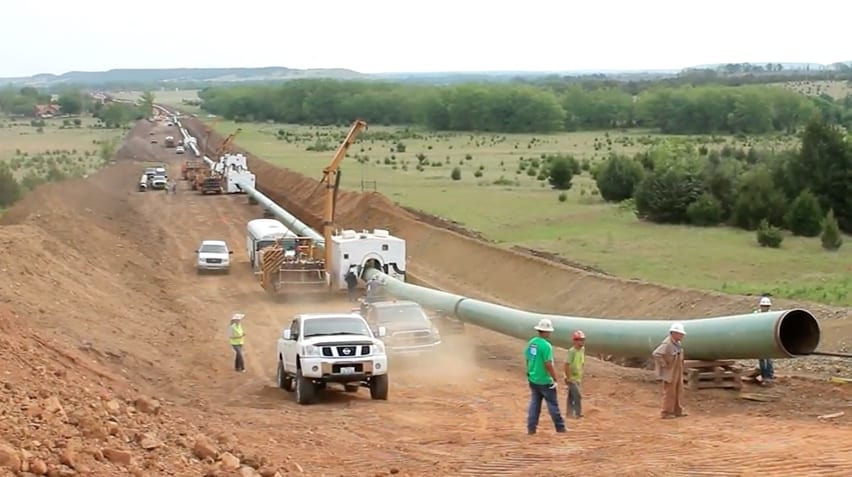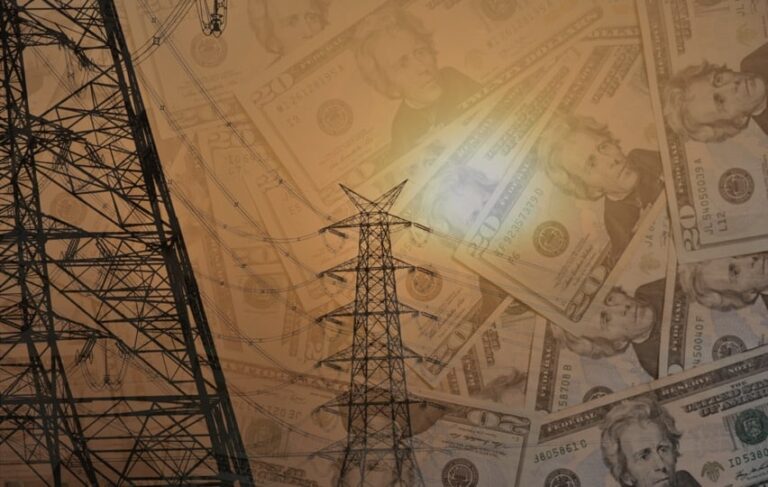Gas Continues to Drive Profits for DTE Energy as Utility Breaks Ground for New Power Plant and NEXUS Pipeline Nears Completion

Coming off of a record earnings year in which DTE Energy reported $1.134 billion in net income, the company revised its earnings guidance for analysts last month and now expects that it can earn $1.147 billion.
“To be honest. We’re crushing it,” said CEO Gerry Anderson.
DTE’s ability to ‘crush it’ is a result of the billions of dollars the utility has invested in natural gas infrastructure. Its natural gas and pipelines business segment contributed $275 million in income towards the company’s overall earnings last year, up from $51 million in 2010 – a 439% increase.
This year, the utility expects its gas and pipelines business will earn upwards of $235 million.
This is likely just the beginning of DTE Energy’s ability to make hundreds of millions of dollars by building and acquiring fossil fuel infrastructure. However, this comes at a time when policymakers are telling regulators who approve of these infrastructure projects that they must minimize ratepayer costs by better mitigating stranded asset risk of new natural gas plants and pipelines since the price of renewable energy and storage continues to decline.
Simultaneously, climate scientists continue to warn about methane emissions produced by shale gas from wellhead to delivery since methane is an incredibly powerful greenhouse gas.
Nevertheless, DTE Energy has received approval to spend ratepayer money and build a $1 billion 1,100-megawatt gas plant. DTE Energy ceremoniously broke ground on that power plant today, and in just a few weeks, its $1.3 billion share of the NEXUS pipeline that is co-owned with Enbridge will be in service. (Update: on October 10, FERC approved NEXUS to begin service.)
The new gas power plant, called the Blue Water Energy Center, is located in St. Clair County and is set to be completed by 2022. The pipeline will transport gas from the Utica and Marcellus gas fields to Michigan where some of the gas will go to the DTE Gas business segment and its ratepayers. The pipeline will also connect with other pipelines, including another DTE pipeline, that transport gas through St. Clair County and into Canada.
Critics have argued that DTE does not need such a large gas plant, and instead could have utilized energy efficiency and renewable energy to lower bills and meet demand reliability. Groups also challenged the utility at the federal level over DTE’s argument that there is sufficient demand for more natural gas and therefore the need for the pipeline. James Clift, policy director for the Michigan Environmental Council, told Midwest Energy News’ Andy Balaskovitz earlier this year that DTE Energy could force its electric ratepayers to be on the hook to buy the gas at the new St. Clair County plant since the pipeline isn’t fully subscribed.
“When an affiliated company is looking to make money off of a natural gas pipeline, we’re worried that this is basically biasing the company in favor of natural gas … In the short term they might be doing some competitive bidding, but in the long term they’re hanging their hat on the NEXUS pipeline,” Clift said.
DTE Energy told Balaskovitz that it has not decided what company would supply the St. Clair County plant. But during the Michigan Energy Providers Conference in Traverse City, Michigan last month, DTE’s Mark Stiers, president and chief operating officer of DTE Gas, mentioned how NEXUS will be serving power plants when he told the audience that the company’s St. Clair County power plant is in the perfect spot due to Michigan’s geography and geology. Stiers then said NEXUS will be “bringing incremental capacity to serve these very needs around power generation.”
Marcellus Drilling News also notes that the new power plant “is a potential (we’d say likely) customer” of Marcellus and Utica fracked gas coming into Michigan via the NEXUS and Rover pipelines.
On the previous two investor calls, analysts have asked questions about NEXUS subscribed capacity.
In April, Michael Weinstein of Credit Suisse Securities asked about the company’s ability to contract the remaining gas of NEXUS and asked if the company is seeing the sufficient demand to “fill the pipe by the completion of construction.”
Jerry Norcia, DTE Energy’s president and chief operating officer, said, “Yes we are … we just need to get ink on paper at this point … lots of negotiations back and forth, as you can imagine. And we are positioned as one of the pipes that does have capacity to bring to the market quickly. So we feel confident that we’ll start closing deals here.”
However, during the July call with analysts, the tone appeared to have shifted. Jonathan Arnold of Deutsche Bank asked if the company would be able to complete contracts by the time NEXUS enters service.
Gerry Anderson said, “Jonathan, I would say that last quarter we were saying that we are holding on to capacity that we feel is really valuable in this basin as capacity becomes short in this basin — in a growing –- very quickly growing basin.”
Arnold then asked if the company would complete contracts this calendar year.
“The way these things play out is serious discussions happen once your pipe is in construction,” said DTE’s Chief Financial Officer Peter Oleksiak. “But I think we will see deals closed not over multiple years, but I think it’s going to take months for what Gerry talked play outs will considerably see late 2018 into 2019 for these discussions to play out.”
FERC Commissioner Richard Glick highlighted the pipeline’s lack of contracts in his dissent in the agency’s denial for a rehearing on NEXUS issued on July 25. Glick said that FERC should have considered additional factors to determine whether or not the project is in the public interest. Glick further writes that his colleagues have dismissed evidence that challenged future natural gas demand growth:
“Looking beyond precedent agreements to other proof of need is especially critical when nearly half of the Project’s capacity as proposed remains unsubscribed and the record contains evidence raising serious questions about the Project’s underlying need. Instead, the Commission dismisses the evidence challenging future demand growth out-of-hand, baldly concluding that it is “unpersuaded” by studies submitted to demonstrate insufficient demand …
The Commission selectively points to evidence of expected demand only in instances where it backs the Commission’s conclusions while summarily rejecting the same type of evidence when it does not support the Project. I oppose this inconsistent and arbitrary application of the Certificate Policy Statement for the purposes of evaluating project need.”
Nevertheless, despite the warnings of stranded assets and methane emissions, DTE executives plan to spend between $2.8 billion to $3.4 billion through 2022 for gathering and natural gas pipeline investment expansion and is in the midst of a gas main replacement project that will cost ratepayers billions of dollars.
During the second quarter call, an executive mentioned more pipeline acquisitions to come and even said the company is currently examining “one asset in particular.”
Photo source: Youtube



